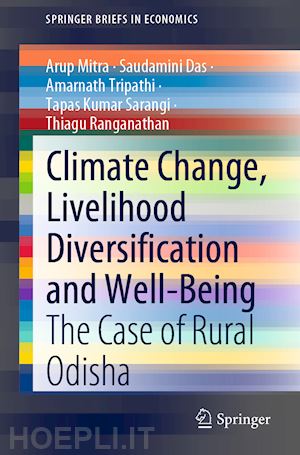
Questo prodotto usufruisce delle SPEDIZIONI GRATIS
selezionando l'opzione Corriere Veloce in fase di ordine.
Pagabile anche con Carta della cultura giovani e del merito, 18App Bonus Cultura e Carta del Docente
Arup Mitra is Professor of Economics at the Institute of Economic Growth, Delhi. He earlier served as Director General of the National Institute of Labour Economics Research and Development (NILERD) and as Dean, Faculty of Economics, South Asian University. He also worked as Senior Researcher at the International Labour Organization (Geneva), was offered a visiting fellowship at the Institute of Developing Economies (Tokyo), held the Indian Economy Chair at Sciences Po (Paris) and was Visiting Professor at the Graduate School of International Development, Nagoya University (Japan). The Indian Econometric Society awarded him the Mahalanobis Memorial Gold Medal for his outstanding contributions in the field of quantitative economics and his book on Inclusive Growth (Springer, 2013) received the S.R. Sen best book award in 2019.
Saudamini Das is NABARD Chair Professor at the institute and is Fellow of South Asian Network for Development and Environmental Economics (SANDEE), Kathmandu, and worked as Mälar scholar at the Beijer Institute of Ecological Economics, Royal Swedish Academy of Sciences, Stockholm, during 2011–12. Her research areas are climate change adaptation, assessment of loss and damage to livelihood due to climate change, valuation of ecosystem services, coastal vulnerability analysis and evaluation of public policy.
Amarnath Tripathi is Associate Professor of Economics at the Department of Economics and International Business, School of Business Studies, Sharda University, India. Previously, he was with the Symbiosis School of Economics, Pune; Institute of Economic Growth, Delhi and Indira Gandhi Institute of Development Research (IGIDR), Mumbai. He completed his Ph.D. in Economics from Banaras Hindu University, Varanasi, and post doctorate from Institute of Economic Growth, New Delhi, under Think Tank Initiative of International Development Research Centre, Ottawa, Canada.
Tapas Sarangi is Assistant Director, NILERD, New Delhi and before that he worked as ‘Think Tank Initiative Fellow’ at Institute of Economic Growth, Delhi; as ‘Senior Researcher’ and as ‘Visiting Fellow’ at Centre for Economic and Social Studies (CESS), Hyderabad; ‘Senior Research Officer’ (DGM Rank) with the NABARD—Bankers Institute of Rural Development (BIRD), Lucknow, and as Consultant at Xavier Institute of Management (XIM), Bhubaneswar.
T. Ranganathan is Associate Professor, Centre for Development Studies, Trivandrum, India. Prior to that he was Assistant Professor at IIM Nagpur, Institute of Economic Growth, Delhi. He obtained his Ph.D. from IIT Bombay, and his areas of specialization are agriculture and plantation crops, employment and social security.











Il sito utilizza cookie ed altri strumenti di tracciamento che raccolgono informazioni dal dispositivo dell’utente. Oltre ai cookie tecnici ed analitici aggregati, strettamente necessari per il funzionamento di questo sito web, previo consenso dell’utente possono essere installati cookie di profilazione e marketing e cookie dei social media. Cliccando su “Accetto tutti i cookie” saranno attivate tutte le categorie di cookie. Per accettare solo deterninate categorie di cookie, cliccare invece su “Impostazioni cookie”. Chiudendo il banner o continuando a navigare saranno installati solo cookie tecnici. Per maggiori dettagli, consultare la Cookie Policy.